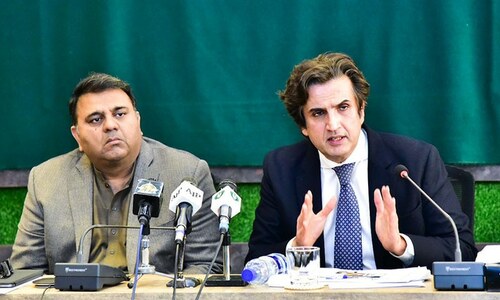Prime Minister Imran Khan launched the National Small and Medium Enterprises (SMEs) Policy on Wednesday, underlining the importance of supporting small businesses and startups and saying the country would see the benefits of this policy in days to come.
Addressing the policy's launching ceremony in Islamabad, the premier said the government was now directing its efforts towards facilitating the SME sector, which he said was ignored previously.
"We are giving it incentives ... and the importance that it was not given until now."
He highlighted that one of the most significant steps taken under the new policy was facilitating small businesses in taking loans from banks.
"The SME sector is the biggest source of employment and has a considerable share in wealth creation," he underscored, regretting that in Pakistan, the SME sector's contribution to the gross domestic product (GDP) was not as much as it should be.
The prime minister identified difficulties faced by small businesses in getting loans and credits as one of the reasons behind it not contributing to the GDP to its full potential.
In this regard, he gave the example of Silicon Valley — the hub of startups and global technology companies in the US.
He said Silicon Valley, where ideas of young people were supported by means of making resources available to them, brought about a "revolution of technology" in the US.
"Venture capitalists backed ideas [there], they took a chance, and people as young as 25 tp 26 year old went on to become billionaires," he said.
The youth, he said, were more driven, passionate and "dream big". As one grows older, the premier added, "we take fewer risks ... and initiatives".
"Therefore, it is important that the government facilitate the youth [in getting] credit," Prime Minister Imran explained, also encouraging the private sector to make venture capital investments.
He also expressed pleasure over a "$500 million investment in Pakistani startups from outside the country".
Previously, he recalled, the investment in the sector from outside the country was negligible. "And this means that we are heading in the right direction."
As the prime minister again stressed the importance of investing in the youth, he went on to identify further reasons that hampered the progress of SMEs.
Besides difficulties in borrowing from banks and getting credit, high property prices was another problem they faced, he said.
"The land is so expensive in cities that it is difficult for them to buy property to establish a setup," the prime minister elaborated, adding that the government was now giving them land on lease as part of its efforts to facilitate them.
Yet another problem, he said, was red-tapeism.
To address this, "our government has decided that we will take action against any department found to be creating hurdles for an enterprise, [be it] associated with the agriculture, industrial or services [sector], that creates employment," he added. "We will take action against anyone creating hurdles for them."
Turning his attention to exports, he said, "We feel ashamed that countries like Singapore, which has a much smaller population than Pakistan, have surpassed us in terms of exports." Their exports to population ratio was much higher than that of Pakistan, he noted.
"So we have to focus on exports and we will give special preference to [entities] that export. All of the government's orientation will be towards wealth creation now and SMEs have a big role to play in this regard," the premier said.
Moreover, he continued, the government was also trying to reduce regulations for SMEs to further facilitate them. In this regard, he particularly spoke about the "NOC (no-objection certificate) regime", which hampered the progress of SMEs.
The prime minister said "inspections are also being streamlined. We will make complete use of information technology".
Read: How effective is the new SME policy?
He added that "Pakistan will see in days to come how beneficial this policy launched today will be for the society."
The prime minister assured that he would preside over meetings to address any issues faced in the implementation of this policy.
Through this policy, he said, "we are giving an opportunity to Pakistanis to participate in the country's wealth creation."
On a separate note, he recounted the problems his government faced at the beginning of its tenure and credited it for "record exports, remittances and tax collections" despite these challenges.
Expressing the hope that the government would exceed the tax target of Rs8,000 billion he intended to achieve during the five-year tenure of his regime, Prime Minister Imran said work was being done with the help of the National Database and Registration Authority to develop a system for identifying persons and entities that didn't pay taxes.
"Yes the situation is not good," he acknowledged, identifying rising inflation as one of the factors behind it.
But inflation, he said, was not because of the government's decisions but because "imports increasing three time is bound to exert pressure on the rupee".
"And there has also been pressure due to rising prices of commodities in the international market," he said. "Despite this, you see wealth creation today," he said, adding that it was a result of decisions and reforms by his government.













































